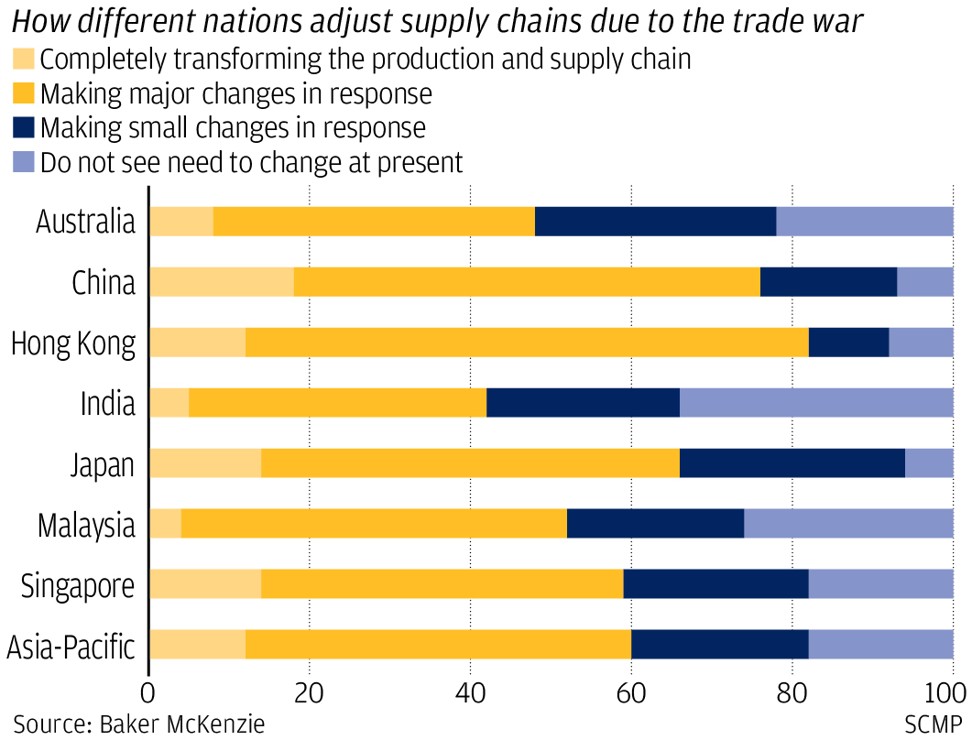
Japan and South Korea enter the fray of a growing war on not just trade, but also global supply chains
- Under attack, the previously underrated and ignored supply chain, essentially the nervous system of international trade, is starting to deliver painful shocks throughout the global economy

Trade wars have opened up a new front in Asia, with Japan’s decision to restrict exports to South Korea of certain chemicals used in hi-tech and strategic applications – just when the US is locked in a trade war with China. But what is most alarming is what is happening behind the front lines.
Few people seem to take the threat to supply or value chains as seriously as they should, which is due largely to the hidden nature of these myriad and vital links among countries and companies across Asia and beyond. They are the nervous or vascular system of the global economy, unseen and unheeded until they malfunction.
Mercifully (even if maybe rather late in the day), some senior economists are beginning to sound the alarm, although at a time such as this, when ignorance is regarded as bliss among populist political leaders, rational voices are rather easily drowned out.
International Monetary Fund chief economist Gita Gopinath said last week, that disputes over trade and technology, such as the United States’ decision to put Chinese tech company Huawei on its entity list, have a damaging impact on global trade and could fracture global supply chains.
The damage to supply chains goes far beyond the impact on Huawei. Supply chains comprise myriad companies, from giants like Huawei and legions of other multinationals, to tens (or maybe hundreds) of thousands of smaller firms, all of which have invested years, even decades in building the international trading system as we know it.

The system is being trashed now by the likes of US President Donald Trump, who seem to be much better at breaking than making the mould of economic activity and prosperity. Supply chains are the mechanism by which these economic shocks will be transmitted to the world, rather than the financial markets, which have lost touch with the real economy.
We have already begun to see this happening as trade growth declines, production slows and corporate earnings fall short of inflated expectations. These are the second-round effects of Trump’s tariffs against China (where no end is in sight to trade friction), Europe and – until recently – Canada and Mexico. Japan, too, remains in Washington’s sights.
There is almost certainly worse to come and it is likely to affect Asia in particular, where the nexus of supply chains centres on Japan, South Korea, China and Southeast Asia – as well as, of course, the US. They are bound together by supply and demand from multiple production and service activities, of which electronics and vehicle manufacturing are only a small part.
Seemingly taking a leaf out of Trump’s (foolish) book of how to clobber your enemy with tariffs or other restrictive trade measures, Shinzo Abe’s administration in Japan this month decided to restrict exports to South Korea of certain chemicals used in hi-tech applications such as semiconductor manufacturing.
The Abe administration denies that this is retaliation against a recent South Korean court decision ordering Mitsubishi Heavy Industries and other Japanese firms to compensate South Korean women “recruited” to work in Japanese factories during wartime.
Whatever the merits or demerits of arguments on both sides, the timing of Japan’s decision to review licensing procedures on exports to South Korea seems very poor, given the already eroding support for international trade, and fragile business and investment confidence.
Whether in Japan’s moves and the threat of South Korean retaliation this has provoked (just as China has retaliated against anti-Huawei actions) or in Britain’s planned withdrawal from the European Union (with all the damage that is going to do to economic exchanges), what we are seeing is the erosion of global production networks.
These were built on the back of a largely tariff and barrier-free world trade order. It is foolish to suggest, as Trump does, that supply chains will continue to function and prosper, just without countries like China at their centre.
Just think how long it took world trade to recover from the Great Depression the 1930s – and even then, it took World War II and armaments production to pull it out of the trough. And in those days, trade networks were far less comprehensive and capable of transmitting economic shocks around the world.
What can raise the world’s vision above the depressing spiral of protectionism and recession (or inward-looking narrow-mindedness), which it seems to be slipping into now, led by Trump’s America? I would say the sheer ambition of China’s Belt and Road Initiative. It has its faults but at least it aims to build and connect rather than destroy and divide.
Anthony Rowley is a veteran journalist specialising in Asian economic and financial affairs